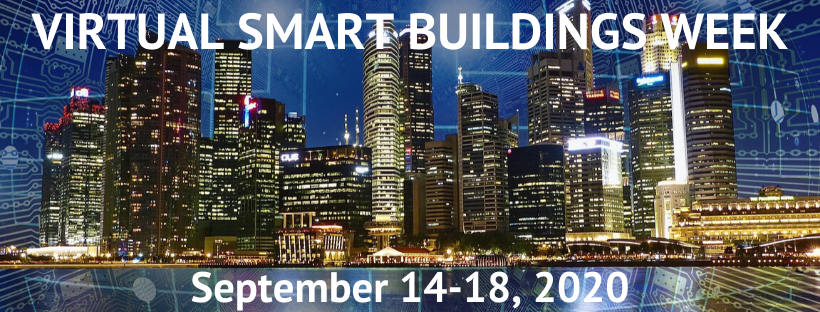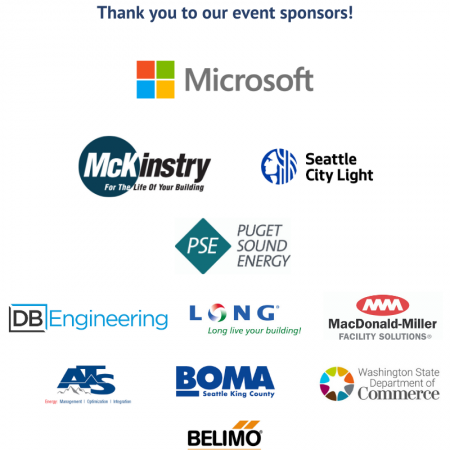
In place of the planned in-person Smart Buildings Exchange 2020 event, we hosted a free Virtual Smart Buildings Week September 14th-18th, 2020. Each day during the lunch hour, a virtual session crafted from key topics and speaker commitments for our planned in-person event featured a lively and interactive panel discussion as outlined below. These one-hour sessions each qualify for 1 Building Operator Certification (BOC) credential maintenance point and 0.10 IACET CEUs towards the renewal of industry certifications, certificates and licenses including but not limited to AIA, PE, LEED, IFMA, ASHRAE, and AEE.
Watch the Smart Buildings Week Welcome Address from Rimes Mortimer, General Manager of Industry Innovation at Microsoft Corporation.
Smart Buildings: Using Data and Analytics to Improve Performance
September 14th, 2020, 12:00 – 1:00 PM
Watch Recording
Download Slides
This session brings together two leading local smart service providers and two facility directors who have real world experience bringing smart solutions to their buildings. Designing for optimal performance is no guarantee that it will happen. The ability to acquire system performance data is no guarantee that the data will trigger operational improvements. In these two case studies, buildings that should have been “top of their game” needed a new approach. Attendees will hear how ATS Automation and DB Engineering intervened to help facility directors collect relevant data from installed building systems, use analytical tools to provide insights into performance problems, and then – most importantly – help those facilities take action. The results speak for themselves. Improved energy performance that is persisting over time.
Moderator: Stan Price, Smart Buildings Center
Panelists:
 Pete Segall, ATS Automation
Pete Segall, ATS Automation
Pete leads a team of energy and building performance engineers with the core mission of better building performance through optimizing energy management systems, developing new and innovative facility solutions, and leveraging state grants and utility incentives. Pete has been providing energy management and facility solutions consulting support across all vertical markets for over 23 years. Pete has a mechanical engineering degree from the University of Washington, an executive leadership certificate from Seattle University, and is a Certified Energy and Demand Side Manager.
 Trevor Sodorff, DB Engineering
Trevor Sodorff, DB Engineering
Trevor is the Director of Engineering Analytics for DB Engineering. His career has been spent bridging the gap between traditional building systems and the technological innovations pulling them towards modernity. He focuses primarily on practical applications for Smart Building technologies and how they can force the evolution of the somewhat conservative building industry into one that embraces – and demands – betterment. He holds a degree in Mechanical Engineering from Washington State University, and is a licensed Professional Engineer in Washington State. He has actively supported the deployment of many Smart Building projects around the world, and has consulted some of the world’s largest corporations and governments – both domestic and foreign – on best practices and deployment strategies.
 Tim Wingert, CBRE
Tim Wingert, CBRE
Tim Wingert is a Chief Building Engineer Supervisor for CBRE, currently overseeing the Property Management Engineering operations for the 1 million square foot Amazon leased AM West campus in the South Lake Union area of Seattle. He manages 10 engineering professionals and works with his property management team to develop operating and capital budgets, directing and overseeing the performance of building engineers for all maintenance, repair, or replacement of systems, equipment, and components. Mr. Wingert is an accomplished manager and leader, committed to a systems-oriented approach to facility maintenance, customer service, and personnel training, emphasizing value added to client assets through enhanced safety and efficient practices.
Keith Berkoben, Google
Keith Berkoben is a senior Google engineer with fifteen years of experience in IoT and seven years focused on building systems. In his role, Keith is responsible for the design and implementation of technology to accumulate, analyze and act upon data at scale across Google’s real estate portfolio.
Smart Buildings: Grid Enabled (and Efficient) Buildings
September 15th, 2020, 12:00 – 1:00 PM
Watch Recording
Download Slides
Grid enabled buildings (GEB) are equipped with technologies for load management that can respond to dynamic conditions in the electric grid. GEBs are generally more efficient (HVAC, lighting, envelope, appliances), connected (hardware and software), smart (data and analytics), and flexible (loads, generation, storage). In an environment where hardware is increasingly attractively priced and a plethora of data is available, building owners are able to provide a significant benefit to a utility’s growing portfolio of resources and play a creative role in meeting its resource capacity needs in real time and for the long term. GEBs also offer the owner the additional value proposition of taking more control of their utility costs.
An expert, national panel will describe the key features of GEBs and outline the value streams that accrue to both the building owner and the serving utility in creating this grid enabled relationship. The panel will discuss both the technology required to create a two-way communication condition as well as the cost and benefits to all the parties in making GEBs a reality.
Moderators:
Ben Levie, Seattle City Light
Ben manages a team of engineers, architects, and energy professionals to evaluate and incentivize energy efficiency projects for commercial customers. His team’s focus is on health care, multifamily, and large office buildings – both retrofit and new construction. He has been directly engaged in projects in the utility’s Pay for Performance, Existing Building Commisioning, and Energy Efficiency as a Service programs. In addition he is active in demand response, large solar, and various electrification efforts including eco district projects. Prior to his current position, he has worked in energy management and biofuels with Weyerhaeuser.
Mark Lenssen, Puget Sound Energy
Panelists:
 Alexi Miller, New Buildings Institute
Alexi Miller, New Buildings Institute
Alexi is a Senior Project Manager at NBI and is NBI’s lead engineer. He brings insight and analysis about cutting-edge technologies and strategies to diverse stakeholders as part of a wide-ranging effort to improve the energy performance of the built environment. Alexi leads several programs and initiatives at NBI including the GridOptimal Initiative, the Public Buildings Portfolio Management Initiative, the Getting to Zero Buildings Database, and FirstView. Alexi has expertise in a range of topics including zero energy and zero carbon buildings, code and policy, building controls, deep energy savings retrofits, and emerging technologies. Prior to joining NBI in 2013, he spent six years at The Cadmus Group. Alexi is a registered Professional Engineer in Mechanical Engineering in Oregon and is a LEED accredited professional. He is fully fluent in Spanish and conversationally fluent in Portuguese.
 Cara Carmichael, Rocky Mountain Institute
Cara Carmichael, Rocky Mountain Institute
Cara is a Principal with Rocky Mountain Institute’s buildings practice where she focuses on net zero energy and deep energy retrofits in the federal and commercial building sectors. In addition, she is leading efforts on the profitable integration of buildings with the grid. Cara Carmichael co-leads the Pathways to Zero initiative at RMI which is catalyzing early movers in the buildings industry on a path to—or beyond—zero net carbon buildings, by working with individual buildings, districts, cities and portfolios. Highlights of her work include leading negotiation for one of the first net zero energy commercial leases in the U.S., leading the design and construction for both of RMI’s net zero energy offices, the Innovation Center and Boulder Commons, and guiding the GSA to double their historic energy savings using performance contracting.
 Mark Frankel, Ecotope
Mark Frankel, Ecotope
Mark is the Director of Technology and Innovation at Ecotope, Inc. in Seattle. Ecotope is a research and design engineering firm at the cutting edge of building decarbonization, working with designers, manufacturers, and policymakers to identify and deploy new strategies to move the market toward carbon-free system strategies. Currently Mark is involved in national coalitions to decarbonize building systems, develop strategies for improved building/grid integration, and in the development of innovative codes and policies focused on building performance outcome and benchmarking. Mark has been consulting on energy efficiency and sustainable design for over 30 years, and has consulted on hundreds of capital projects, ranging in scale from single and multifamily residential projects to large commercial building and portfolio strategies. Mark has served on the boards of USGBC, ILFI, and Seattle 2030 District. Mr. Frankel is a LEED Fellow, member of AIA and ASHRAE, and a licensed architect.
 Mary Ann Piette, Lawrence Berkeley Laboratory
Mary Ann Piette, Lawrence Berkeley Laboratory
Mary Ann is a Senior Scientist, Director of the Building Technology and Urban Systems Division and Senior Science Advisor to the Associate Lab Director of Energy Technologies Area at Lawrence Berkeley National Laboratory. She oversees LBNL’s building energy research activities with the US Department of Energy and over 25 other R&D sponsors. She is also the Director of the Demand Response Research Center. Mary Ann’s work involves developing and evaluating new technology and building components, controls, operations, simulation, whole building and electric load shape analysis and behavior. She is also lead researcher at LBNL on the automated demand response technology. Mary Ann has authored over 90 peer reviewed publications related to energy efficiency and demand response and has worked at LBNL since 1983. She has a MS in Mechanical Engineering from UC Berkeley and a Licentiate in Building Services Engineering from the Chalmers University of Technology in Sweden.
Smart Buildings: Achieving Persistent Operational Performance
September 16th, 2020, 12:00 – 1:00 PM
Watch Recording
Download Slides
Facility energy performance and operations are often in direct conflict. It’s tough to hear, but the scales are not balanced for building owners or operators. Social pressure, building codes and new legislation are pushing EUI targets lower and lower. Advanced energy systems and smart building controls tease easy answers during initial design and construction, but the harsh reality is that designing an efficient building does not translate to operations success and often only adds to reactive practices, deferred maintenance and risk. In most cases, operators are not prepared to take on complicated building systems and new-to-them technologies. With inadequate training or resources, overtaxed staff override system settings to simply make it work. The result inadvertently drives up energy consumption and negates all efforts to optimize energy performance during design and construction while reducing asset life and introducing unnecessary risks.
The transition to smart and sustainable operations offers a best practice that balances the scales between energy expectations and operational realities. Panelists will outline proven approaches on actual projects that bridge design, build, train, optimize to ensure current energy requirements are effective and met.
Moderator: Ric Cochrane, McKinstry
Panelists:
Mike Kowalick, South Landing EcoDistrict
 Roy Buchert, Kaiser Permanente
Roy Buchert, Kaiser Permanente
As a subject matter expert, Roy’s main role is to develop and execute strategies and action plans to help Kaiser Permanente achieve its energy and sustainability goals across their Washington portfolio. He is a strategic leader passionate about our Planet and creating interactive dialogues on how together, everyone can best leverage each other to deliver the biggest positive impact. Roy has more than 17 years of experience in helping McDonald’s and Starbucks achieve their energy and sustainability goals.
Norm Menter, University of Washington
Smart Buildings: Creating Intelligent Spaces
September 18th, 2020, 12:00 – 1:00 PM
Watch Recording
Download Slides
The Internet of Things (IoT) is transforming the world, including the built environment. This transformation is already underway leading to improved organizational productivity, better space utilization, and more efficient and healthier buildings. To make this transformation successful, it’s important to both understand the technology and practices as well as the cross-organizational nature of adopting smart projects. Microsoft has keen insight here based on its own adoption of smart technologies at their buildings as well as through close working relationships with its partner ecosystem. Microsoft will share a number of key considerations that can help building owners and operators make a successful transformation to buildings that are more agile, flexible, efficient, and productive.
Speaker:
 Spyros Sakellariadis, Microsoft
Spyros Sakellariadis, Microsoft
Spyros is an IT professional focused on defining and developing innovative solutions that impact the way people do things. He’s currently working on smart buildings and places around facilities operations, occupancy, security, and all things sustainability – carbon/energy, water, and waste management – leveraging technologies like IoT, real time analytics, big data, field service/workforce management, and frontline worker support.
Spyros holds degrees from the University of Oxford (Physics and Philosophy) and Pittsburgh (History and Philosophy of Science), and has worked in many fields, including defense contracting, export trading, leasing, and AIDS research. He started a computer company aeons ago, sold it to Wang, went into Internet application hosting before it was a ‘thing’, and finally saw the light and joined Microsoft in 2003. Spyros has published multiple articles in trade journals, and holds several patents.
Register now for these engaging virtual panel discussions during Smart Buildings Week!

